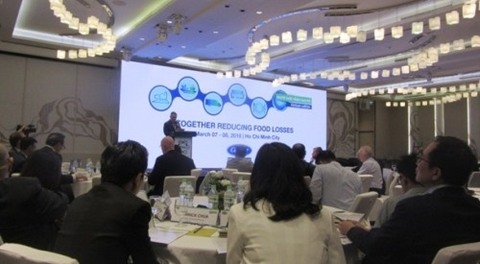
A roadmap to reduce food loss and wastage using cold chain technology is important to secure the future of food not only in Việt Nam but also elsewhere, experts told the 2018 World Cold Chain Summit. — Photo thoibaonganhang.vn
A roadmap to reduce food loss and wastage using cold chain technology is important to secure the future of food not only in Viet Nam but also elsewhere, experts told the 2018 World Cold Chain Summit.
The summit, held in HCM City on Wednesday, was the fourth since its inception in 2014 but first to focus on cold chain development efforts in one specific region.
According to United Technologies Corp.’s chief sustainability officer, John Mandyck, the world today produces enough food to feed 10 billion people.
“However, in a world of seven billion people, only six billions are getting adequate nutrition and food."
“People waste 40 percent of what they grow, mostly fruits and vegetables,” he said, adding that one-third occurs at the household level and two-thirds in the cold chain.
David Appel, president of Carrier Transicold and Refrigeration Systems, said there is a huge opportunity to cut food waste and improve food distribution by implementing quality cold chain technology.
“This does not only help secure the future of world food and feed more people but also eventually reduce greenhouse gas emissions associated with the supply of food.”
In fact, food waste ranks as the third largest emitter of greenhouse gas emissions after the US and China, according to the United Nations Food and Agriculture Organisation (FAO).
Viet Nam’s food supply chain loses an estimated 5.75 million tonnes of food a year, accounting for 60 per cent of the country’s entire urban solid waste, Viet Nam’s National State of Environment had reported in 2011.
“The goal for the 2018 World Cold Chain Summit is to develop a road map to reduce food loss and waste in Viet Nam that can also be applied in the APEC region and extended globally,” Appel said.
A connected global dialogue between stakeholders is thus necessary to expand the cold chain around the world, Mandyck added.
But he was positive despite the many challenges that the hidden source of food that can sustainably feed Viet Nam and the world would be uncovered. – VNS